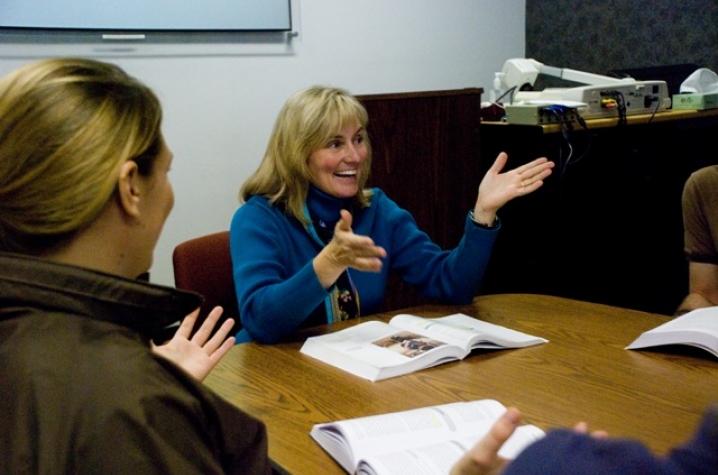Cutting-Edge Communication Initiative

LEXINGTON, Ky. (Sept. 30, 2010) − You can hear the excitement in Deanna Sellnow's voice as she talks about the new Division of Instructional Communication at the University of Kentucky's College of Communications and Information Studies.
"It's one of the most innovative communication initiatives happening at UK and across the country in higher education today," said Sellnow, who serves as the director of Undergraduate Studies in Communication, as well as director of the new Division of Instructional Communication. "No other university is collaborating not only across units within a college, but also across colleges to deliver the integrated composition and communication curriculum we’re implementing here at UK."
So what's all the fuss about? A changing approach to composition and communication instruction, said Sellnow. As part of UK's general education reform, set to roll out in full force next fall, the College of Communications and Information Studies is partnering with the College of Arts and Sciences to integrate oral, written, visual, and digital communication instruction into a two-semester course sequence required for all incoming UK freshmen.
"There's a really strong demand for college graduates who can demonstrate effective integrated communication skills, as well as for faculty with the expertise in instructional communication to teach the courses, to train and supervise teachers, and to assess learning outcomes and instruction," said Sellnow. Integrated communication embodies a holistic approach to communication that focuses not only on formal speech and writing, but also emphasizes interpersonal and teamwork skills. Students in the general education courses will present ideas face-to-face, in writing, to community partners outside UK, and through online media. Sellnow says this combination of skills is in high demand for today's professionals.
Sellnow is working with Roxanne Mountford, director of the College of Arts and Sciences' Division of Writing, Rhetoric and Digital Media to bring these new courses to UK students. The College of Communications and Information Studies' efforts to bring in other disciplines within the college and beyond it are what really set this initiative apart, said Sellnow.
"No one is doing a cross-college effort to really understand the nature of these cross-disciplinary skills," said Sellnow. "Students are going to be able to understand how composition and communication are similar and different across these modalities."
The two-course sequence has already begun as a pilot program, with 35 sections of the first course being taught this semester. The first course, called Composition and Communication I, focuses on helping students learn to effectively communicate messages across written, oral, visual and digital modalities, representing a relevant and informed point of view. Essentially, students develop an understanding of themselves and their relationship among the many communities around them. Attention to the audience, purpose, and occasion of the communication is emphasized. In the second course, Composition and Communication II, students learn to research and analyze, as well as develop and convey cogent arguments, particularly about issues of public interest. Sellnow and others will assess outcomes from this two-semester pilot program, make adjustments, and then roll out the full program for all incoming UK freshmen in Fall 2011.
"We're very excited about the new initiative by our college, in addressing the communications needs of our students," said Dan O'Hair, dean of the College of Communications and Information Studies. "Through communication skills, writing skills and digital literacy, we'll be on the cutting edge of all universities in readying our students for the 21st century."
Nancy Harrington, chair of the Department of Communication and associate dean for research, said employers have been looking for these types of communication skills for a long time.
"The workplace has been clamoring for this for decades. Our goal is to meet that demand," she said. "When it works, it's going to make UK a leader in the nation in communication skills education."
The college is putting additional resources behind this new initiative, with two assistant professors and seven lecturers already hired to teach in the new Division of Instructional Communication. Another assistant professor will be brought in soon. Harrington said the plan calls for the College of Communications and Information Studies to deliver 40 percent of instruction, with the College of Arts and Sciences providing 60 percent.
"What is really innovative about this is the partnership between the College of Communications and Information Studies and the College of Arts and Sciences," Harrington said. "We're really excited about this approach to teaching comprehensive communication skills."
Sellnow says the university is now beginning the process of looking at the possibility of re-conceptualizing the graduation writing requirement in terms of how these comprehensive communication skills can be integrated into students' curricula as they complete their majors.
"We're looking to make these connections across their entire college careers," she said. “The foundational skills they will learn during their first year of Composition and Communication I and II ought to eventually evolve based according to what is expected of graduates in the various majors. Composition and communication across the curriculum (CXC) and in the disciplines (CID) is the ultimate goal for UK graduates.”




